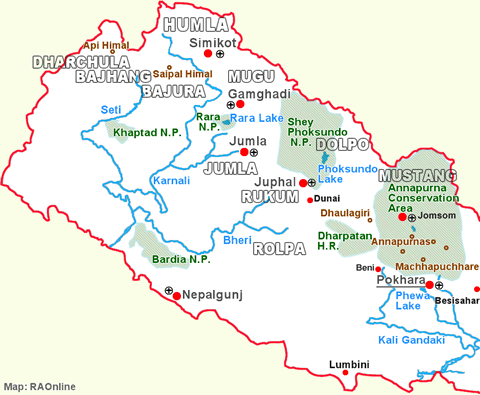 |
Nepal Trekkings |
|
|
 |
| Dolpa - Upper Dolpo - Rara Lake |
| Dolpo
Region: Upper Dolpo |
SOME
SAMPLE TREKS (OUT OF MANY) IN THIS AREA ARE:
ITINERARY
:
Day
01 : Arrival Kathmandu and transfer hotel
Day
02 : Full day sightseeing of Kathmandu v alley
Day
03 : Flight Kathmandu/Nepalgunj, overnight at hotel
Day
04 : Flight Nepalgunj/Jumla
Day
05-23 : Trekking
Day
24 : End trek at Dunai and camp overnight
Day
25 : Flight Dunai/Nepalgunj/Kathmandu
Day
26 : Rest in Kathmandu
Day
27 : Departure to your next destination. |
| Dolpo
Region: Lower Dolpo |
SOME
SAMPLE TREKS (OUT OF MANY) IN THIS AREA ARE:
ITINERARY
:
Day
01 : Arrival Kathmandu and transfer hotel
Day
02 : Full day sightseeing of Kathmandu valley
Day
03 : Flight Kathmandu/Nepalgunj, overnight at hotel
Day
04 : Flight Nepalgunj/Jumla
Day
05-14 : Trekking
Day
15 : Flight Jumla/Nepalgunj
Day
16 : Flight Nepalgunj/Kathmandu
Day
17 : Rest in Kathmandu
Day
18 : Departure to your next destination |
 |
This
is a remote and rugged area, which resembles the high plateau of Tibet
with typical flora and fauna and arid landscape. The area has been declared
a national park namely Shey-Phoksundo National Park (the biggest
national park of Nepal) that covers an area of 3555 square kilometers.
In this national park, blue sheep, musk deer, ghoral, thar, and snow leopards
and many other floras and fauna have been sighted. Visiting of Phoksundo
Lake - one of the deepest lakes in the world and experience of crossing
high passes thrill you throughout the trek. Valleys contain luxuriant vegetation
including blue pine, spruce and cypress and there are good views of the Annapurna
Range and Dhaulagiri peaks.
ITINERARY
:
DAY
01 : Arrival Kathmandu, transfer to hotel
DAY
02 : KTM sightseeing, hotel
DAY
03 : Flight : Kathmandu - Nepalgunj, hotel
DAY
04-13 : Trekking
DAY
14 : Flight : Nepalgunj - Jumla - Nepalgunj - Kathmandu, hotel
DAY
15 : Kathmandu free day, hotel
DAY
16 : Final departure, transfer to airport |
The
Rara Lake lies in the remote far northwest of Nepal. Surrounded by verdant
alpine meadows and steep densely forested ridges abundant with wildlife.
The lake is stunningly beautiful, with unbelievably tranquility, a paradise
untouched. The region around Jumla and Rara Lake is still relatively unexplored.
The area gives a taste of natural wilderness and silence.
| Rara National Park |
 |
Situated in the northwest of Kathmandu, the park includes Lake Rara, Nepal's largest lake, and its heavily forested catchment area, together with a large part of Chuchumara Dara hills to the south. Located between 9000'-15000' feet altitude amidst scenically superb surroundings, this National park provides an ideal focus for tourism in the northwest region of Nepal. Three days walk north of Jumla, it can also now be reached directly by air, an air -strip having been constructed on the southern shore of the lake. The area gives away a considerable variety of wildlife, while in winter the lake serves as a resting place for duck, geese and other migratory waterfowl.
The Rara lake and its surroundings that forms Rara National Park, is situated at about 370 km northwest of Kathmandu. Much of the park is at an altitude of about 3000 metres forested by conifers. 20 different species of mammals such as musk deer, Himalayan Thar, Red Panda, leopard etc and 214 species of birds like Snow Cock, Coots, Grebes, Mallard etc. are found in the park. Similarly, the region is also the home to 500 different kinds of flowers and herbs including rhododendron and juniper.
The Rara lake is the largest lake of Nepal and the entire Mugu district. The district is full of bio-diversities and natural beauty.
| Shey-Phoksundo National Park |
 |
Shey-Phoksundo National Park is in the trans-Himalayan region of Dolpa and Mugu in northwest Nepal. Usually large numbers of blue sheep are found in this park in addition to snow leopard, tibetan hare andother typical Himalayan fauna and flora. It also includes the famous lake phoksundo, shey monastry and the Kanjiroba Himal. It takes two days walk to the entrance gate of the park from Jumla airfield.rival any others in Asia and bring considerable prestige, ecological benefit and, of course, the economical value.
| more information on Nepal |
 |
|






